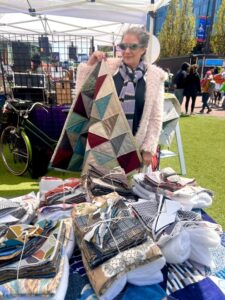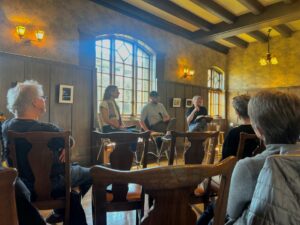At the start of his journalistic career, Samuel Roe never expected to become a Pulitzer-winning investigative reporter. After working for the Toledo Blade in his home state of Ohio, he didn’t expect to move to Chicago to pursue journalism and eventually become a professor.
Nearly 40 years later, he is an acclaimed investigative reporter and an instructor of journalism at Columbia College Chicago.
Roe worked as an investigative reporter for the Blade until one of his stories gained the attention of Chicago Tribune editors. This led to a job offer from the Tribune that brought Roe to Chicago in 2000.
He studied journalism as an undergrad at Kent State, and later studied at Columbia University in New York to get a masters degree in journalism. There, he would meet and study under legendary journalist and professor Melvin Mencher. He taught Roe that journalism is a moral endeavor and that “crappy journalists can do a lot of damage,” Roe said. “I went there thinking I knew everything and found out that I really knew nothing.”
“If you’re not asking the right questions or you’re not skeptical, you can write a story that’s completely false and do a lot of damage,” he said.
For an assignment in Mencher’s class, Roe was tasked with finding a local story in Brooklyn. He landed on a story about above-average attendance rates at a Brooklyn high school and decided to report on what was driving the school’s success. After interviewing the school’s principals, teachers and student leaders, he got the same response for why their attendance rates were so high: “Because we’re like family here.”
He turned the story into Mencher, confident in his reporting and sure he aced the assignment. To his surprise and disappointment, Mencher left “You missed the point of this. See me after class,” in big red ink at the top of his report.
Despite the numerous quotes and statistics that Roe included in his 14-page article, Mencher pointed out a detail that was left uninvestigated.. One teacher at the school had explained that her first and second period classes were always full but by the end of the day, they were almost empty, leaving her to cancel them.
Mencher told Roe to return to the school and redo the assignment to further investigate this detail.
On returning, Roe discovered that the school’s fantastic attendance rates were false and they were allowing students to skip.
“They were literally pulling kids out of bed, putting them in class for the first hour, marking them present, and letting them go back home,” Roe explained. After this assignment, he realized that “The best story I’ve ever done is the one that wasn’t published.” The story for Mencher’s class went unpublished, but remains one of his favorites.
As an investigative reporter, Roe said the biggest struggle was coming up with good, fresh ideas in an industry where everyone else was trying to do the same thing.
“You want an idea that’s going to potentially change the world and make it a better place, but it has to be new and fresh and novel. Those ideas are hard to come by,” he said. Though investigative reporting is his passion, he said it comes with a good amount of stress.
He “wanted to hit home runs,” while his editors wanted him to be productive and settle for smaller stories.
While working on the investigative team at the Chicago Tribune from 2000 to 2019, Roe began teaching journalism and investigative reporting at Columbia College Chicago in 2008. Through his teaching, he strives to instill some of the values and lessons that he has learned throughout his career.
“You’ll never make a lot of money if you don’t go into broadcasting or you’re not Anderson Cooper,” he said. “But if you’re good, you can make enough and you can earn a lot more than you think you can. More than that, it’s super rewarding on a day-to-day basis.”
Roe believes that journalism has the ability to change the public’s minds and can make the world a better place through fair, accurate, and hard-hitting reporting.
Until May, Roe worked as an editor at the Milwaukee Sentinel Journal. He quit to begin writing a book full-time that he hopes to have completed by next year.
“It’s an idea I’ve always loved but I’ve never had the time to do it,” he said.
Roe said that if he could give his younger self a piece of advice, it would be to accept help and not try to do everything by himself.
“There were times that I didn’t have the maturity to listen,” he said. “Being open to criticism and encouragement will take you far.”







Be First to Comment